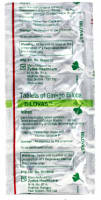NOTICE: unsafe with : Alcohol
USED FOR:
Depression
Schizophrenia
Anxiety disorder
COMPOSITION:
Fluoxetine (20mg)
Olanzapine (10mg)
Therapeutic Uses:
neuro cns

CAUTION
Fostera 20 mg/10 mg Tablet may cause excessive drowsiness and calmness with alcohol.

WEIGH RISKS VS BENEFITS
Fostera 20 mg/10 mg Tablet may be unsafe to use during pregnancy.Animal studies have shown adverse effects on the foetus, however, there are limited human studies. The benefits from use in pregnant women may be acceptable despite the risk. Please consult your doctor.

CAUTION
Fostera 20 mg/10 mg Tablet is probably unsafe to use during lactation. Limited human data suggest that the drug could represent a significant risk to the baby.

Fostera 20 mg/10 mg Tablet may cause side effects which could affect your ability to drive.

Fostera 20 mg/10 mg Tablet is probably safe to use in patients with kidney disease. Limited data available suggests that dose adjustment of Fostera 20 mg/10 mg Tablet may not be needed in these patients. Please consult your doctor.

Fostera 20 mg/10 mg Tablet is probably safe to use in patients with liver disease. Limited data available suggests that dose adjustment of Fostera 20 mg/10 mg Tablet may not be needed in these patients. Please consult your doctor.
Uses of Fluoxetine
Fluoxetine is used in the treatment of depression, anxiety disorder, phobia, post traumatic stress disorder and obsessive-compulsive disorder.
How to use Fluoxetine
Take this medicine in the dose and duration as advised by your doctor. Swallow it as a whole. Do not chew, crush or break it. Fostera 20 mg/10 mg Tablet is to be taken with food.
How Fostera 20 mg/10 mg Tablet works
Fluoxetine is a selective serotonin reuptake inhibitor (SSRI) antidepressant. It works by increasing the levels of serotonin, a chemical messenger in the brain. This improves mood and physical symptoms in depression and relieves symptoms of panic and obsessive disorders.
Common Nausea, Diarrhoea, Insomnia (difficulty in sleeping), Headache, Fatigue.
Expert advice for Fluoxetine
It can take 2-3 weeks for Fluoxetine to start working. Do not stop treatment suddenly as this may cause a stomach upset, flu-like withdrawal symptoms and sleep disturbance. Avoid consuming alcohol when taking the Fluoxetine, as it may cause excessive drowsiness and calmness. If your doctor asks you to stop Fluoxetine, you should reduce the dose slowly over 4 weeks. The addiction/dependence potential of Fluoxetine is very less. You may develop anxiety during initiation of therapy.
Q. Is Fluoxetine a monoamine oxidase inhibitor (MAOIs)?
Fluoxetine is not a monoamine oxidase inhibitor (MAOIs). It is an antidepressant and belongs to a class of medications known as selective serotonin reuptake inhibitors (SSRIs).
Q. Does Fluoxetine cause sleepiness?
Somnolence (sleepiness) is a common side effect associated with the use of Fluoxetine. However, Fluoxetine can also cause other sleep problems like insomnia (inability to sleep) and abnormal dreams. Talk to your doctor in case you experience sleep problems while taking Fluoxetine.
Q. Does Fluoxetine cause constipation?
Fluoxetine has not been reported to cause constipation. Talk to your doctor if you experience constipation while taking Fluoxetine.
Q. Can I take fluoxetine with citalopram?
Fluoxetine and citalopram both increase the serotonin levels and when used together can increase the risk of serotonin syndrome (fever, muscle stiffness or tremor, confusion, irritability, and extreme agitation). ECG monitoring may also be required as there could be some changes in your heart rhythm (prolonged QTc interval). Talk to your doctor as you may need an alternative for one of these medicines.
Q. Is Fluoxetine a placebo?
Fluoxetine is not a placebo, it is an active drug, an antidepressant which belongs to the class of medications known as selective serotonin re-uptake inhibitors (SSRIs).
Q. Is Fluoxetine a stimulant?
Fluoxetine is not a stimulant. It is an antidepressant and belongs to a class of medications known as selective serotonin reuptake inhibitors (SSRIs)
Q. Can I take fluoxetine with diazepam?
Fluoxetine can be taken with diazepam. No drug-drug interactions have been reported between the two. However, interactions can occur. Please consult your doctor before taking the two medicines together.
Q. Does Fluoxetine cause weight gain?
Fluoxetine does not cause weight gain, rather it causes weight loss, which is a common side effect seen with its use. Weight loss is usually proportional to baseline body weight. Please consult your doctor if you experience a change in weight while taking Fluoxetine.
Q. Does Fluoxetine make you tired?
Fluoxetine can make you feel tired. Fatigue (extreme tiredness) is a very common side effect of Fluoxetine. Please consult your doctor if you experience excessive tiredness while taking it as the dose may need to be changed.
Q. Does Fluoxetine expire?
Yes, like any other medicine Fluoxetine has an expiry date. Please check the expiry date mentioned on the pack before taking the medicine.
Q. Does Fluoxetine help in anxiety?
Fluoxetine is used for the treatment of anxiety and other associated conditions like panic disorder, obsessive-compulsive disorder (OCD) and phobias. It also helps in depression associated with or without anxiety. Consult a doctor for the right treatment of your anxiety before starting any medicines.
Q. Does Fluoxetine cause acne?
Fluoxetine has not been reported to cause acne. Talk to your doctor if you develop acne while taking Fluoxetine.
Q. Does Fluoxetine work?
Fluoxetine works if taken for the right indication at prescribed doses for the prescribed duration as advised by your doctor.
Q. Does Fluoxetine cause a headache?
Headache is a very common side effect of Fluoxetine. Please consult your doctor if you experience excessive headache while taking Fluoxetine.
Q. Does Fluoxetine cause nausea?
Nausea is a very common side effect of Fluoxetine. Please consult your doctor if you experience excessive nausea while taking Fluoxetine.
Q. Can I take Fluoxetine for life?
You should take Fluoxetine only for the duration as advised by your doctor. Also, you should not stop the medicine without consulting your doctor.
Q. How long can I take Fluoxetine for?
You should take Fluoxetine only for the duration as advised by your doctor. You should not stop the medicine without consulting your doctor.
Q. Can I take fluoxetine with paracetamol?
Fluoxetine can be taken with paracetamol, however, when taken together paracetamol can increase the antidepressant effect of fluoxetine. Talk to your doctor before taking the two medicines as there could be other effects of using the two medicines together.
Q. Can I take fluoxetine with amitriptyline?
Fluoxetine may possibly change the blood levels of amitriptyline. Your doctor may need to lower the dose of amitriptyline when administered with fluoxetine. Talk to your doctor before taking these two medicines together.
Q. Can I take fluoxetine with alcohol?
Fluoxetine when taken with alcohol, does not increase the effects of alcohol, however, it may affect your judgment or coordination and make you dizzy. Talk to your doctor regarding the use of alcohol when you are taking fluoxetine.
Q. Can I take fluoxetine with lorazepam?
Fluoxetine can be taken with lorazepam. No drug-drug interactions have been reported between the two. However, interactions can occur. Please consult your doctor before taking the two medicines together.
Q. Can I take fluoxetine with omeprazole?
Fluoxetine may increase the level or effect of omeprazole by decreasing its metabolism. Consult a doctor before taking the two medicines together.
Q. Can I take Fluoxetine with birth control?
Fluoxetine can be taken with birth control pills. No drug-drug interactions have been reported between the two. However, this does not mean that interactions cannot occur. Please consult your doctor before taking the two medicines together.
Q. Can I take fluoxetine with amoxicillin?
Fluoxetine can be taken with amoxicillin. No drug-drug interactions have been reported between the two. However, interactions can occur. Consult a doctor before taking the two medicines together.
Q. Can I take fluoxetine with ibuprofen?
Fluoxetine, when given with ibuprofen, may increase the risk of gastric side effects. Consult a doctor before taking the two medicines together.
Q. Can I take Fluoxetine with phentermine?
Fluoxetine. when given with phentermine, may increase the effects of phentermine like nervousness, anxiety, restlessness. There could also be an increased risk of serotonin syndrome (fever, muscle stiffness or tremor, confusion, irritability, and extreme agitation). The reason for an increase in toxicity is not clear. Please consult your doctor before taking the two medicines together.
Q. Can I take fluoxetine with tramadol?
Fluoxetine when taken along with tramadol, can lead to an increased risk of serotonin syndrome (fever, muscle stiffness or tremor, confusion, irritability, and extreme agitation). Consult a doctor before taking the two medicines together.
Q. Is Fluoxetine safe?
Fluoxetine is safe if taken for prescribed duration in prescribed doses as advised by your doctor.
Q. Is Fluoxetine addictive?
Fluoxetine is not addictive in nature. No habit forming potential has been seen with its use. Always follow your doctor's advice regarding the duration of its use.
Q. Is Fluoxetine safe in pregnancy?
There have been some reports showing an increased risk of birth defects affecting the heart in babies when the mother took Fluoxetine during the first few months of pregnancy. When taken during the last three months of pregnancy, it may increase the risk of a serious condition in babies, called persistent pulmonary hypertension of the new born (PPHN), making the baby breathe faster and appear bluish. These symptoms usually begin during the first 24 hours after the baby is born. So, it is advisable not to use Fluoxetine during pregnancy. If you are pregnant or you are planning to have a baby, ask your doctor for advice before taking this medicine.
Q. Is Fluoxetine a controlled substance?
Fluoxetine is not a controlled substance. It's a prescription medicine and is available on providing a valid prescription.
Q. Can I take fluoxetine with naproxen?
Fluoxetine, when given with naproxen, may increase the risk of gastric side effects. Consult a doctor before taking the two medicines together.
Uses of Olanzapine
Olanzapine is used in the treatment of schizophrenia and mania.
How to use Olanzapine
Take this medicine in the dose and duration as advised by your doctor. Swallow it as a whole. Do not chew, crush or break it. Fostera 20 mg/10 mg Tablet is to be taken with food.
How Fostera 20 mg/10 mg Tablet works
Olanzapine is an atypical antipsychotic. It works by modulating the action of certain chemical messengers in the brain that affect thoughts.
Common Sleepiness, Weight gain, Increased prolactin level in blood, Orthostatic hypotension (sudden lowering of blood pressure on standing).
Expert advice for Olanzapine
Do not take olanzapine tablet if you are allergic to olanzapine or any other ingredient in the medicine.Do not drive or operate machinery immediately after taking olanzapine as it may cause drowsiness.
Avoid taking olanzapine if you have mental illnesses like suicidal thoughts, depression; or suffering from fits (epilepsy), Parkinson’s disease, Alzheimer disease or dementia.
Do not start or continue taking olanzapine, if you are suffering from diabetes; heart problems, high blood pressure or high cholesterol; breathing problems, increased pressure inside the eye that causes visual problems (glaucoma) or other eye related problems.
Do not drink alcohol while taking olanzapine as it may cause drowsiness.
Strides shasun Ltd
₹12/Tablet Out of stock


 Fostera 20 mg/10 mg Tablet
Fostera 20 mg/10 mg Tablet  Bookmark
Bookmark




















